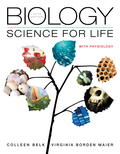
EBK BIOLOGY
5th Edition
ISBN: 9780133996807
Author: Maier
Publisher: PEARSON CUSTOM PUB.(CONSIGNMENT)
expand_more
expand_more
format_list_bulleted
Concept explainers
Question
Chapter 25, Problem 5LTB
To write:
The process happens when the column of xylem is under extreme tension inside a plant.
Summary Introduction
Introduction:
Tension is the force that allows water column to pull into a syringe when the plunger is dragged up. In plants, tension causes water molecules from the xylem to be extracted out into the leaf to replace the evaporated water.
Expert Solution & Answer
Want to see the full answer?
Check out a sample textbook solution
Students have asked these similar questions
what did charles darwin do in science
evolutionary analysis
Can I get this answered with the colors and what type of connection was formed? Hydrophobic, ionic, or hydrogen.
Knowledge Booster
Learn more about
Need a deep-dive on the concept behind this application? Look no further. Learn more about this topic, biology and related others by exploring similar questions and additional content below.Similar questions
- Can I please get this answered with the colors and how the R group is suppose to be set up. Thanksarrow_forwardfa How many different gametes, f₂ phenotypes and f₂ genotypes can potentially be produced from individuals of the following genotypes? 1) AaBb i) AaBB 11) AABSC- AA Bb Cc Dd EE Cal bsm nortubaarrow_forwardC MasteringHealth MasteringNu × session.healthandnutrition-mastering.pearson.com/myct/itemView?assignment ProblemID=17396416&attemptNo=1&offset=prevarrow_forward10. Your instructor will give you 2 amino acids during the activity session (video 2-7. A. First color all the polar and non-polar covalent bonds in the R groups of your 2 amino acids using the same colors as in #7. Do not color the bonds in the backbone of each amino acid. B. Next, color where all the hydrogen bonds, hydrophobic interactions and ionic bonds could occur in the R group of each amino acid. Use the same colors as in #7. Do not color the bonds in the backbone of each amino acid. C. Position the two amino acids on the page below in an orientation where the two R groups could bond together. Once you are satisfied, staple or tape the amino acids in place and label the bond that you formed between the two R groups. - Polar covalent Bond - Red - Non polar Covalent boND- yellow - Ionic BonD - PINK Hydrogen Bonn - Purple Hydrophobic interaction-green O=C-N H I. H HO H =O CH2 C-C-N HICK H HO H CH2 OH H₂N C = Oarrow_forwardFind the dental formula and enter it in the following format: I3/3 C1/1 P4/4 M2/3 = 42 (this is not the correct number, just the correct format) Please be aware: the upper jaw is intact (all teeth are present). The bottom jaw/mandible is not intact. The front teeth should include 6 total rectangular teeth (3 on each side) and 2 total large triangular teeth (1 on each side).arrow_forward12. Calculate the area of a circle which has a radius of 1200 μm. Give your answer in mm² in scientific notation with the correct number of significant figures.arrow_forwardDescribe the image quality of the B.megaterium at 1000X before adding oil? What does adding oil do to the quality of the image?arrow_forwardWhich of the follwowing cells from this lab do you expect to have a nucleus and why or why not? Ceratium, Bacillus megaterium and Cheek epithelial cells?arrow_forward14. If you determine there to be debris on your ocular lens, explain what is the best way to clean it off without damaging the lens?arrow_forward11. Write a simple formula for converting mm to μm when the number of mm's is known. Use the variable X to represent the number of mm's in your formula.arrow_forward13. When a smear containing cells is dried, the cells shrink due to the loss of water. What technique could you use to visualize and measure living cells without heat-fixing them? Hint: you did this technique in part I.arrow_forward10. Write a simple formula for converting μm to mm when the number of μm's are known. Use the variable X to represent the number of um's in your formula.arrow_forwardarrow_back_iosSEE MORE QUESTIONSarrow_forward_ios
Recommended textbooks for you

 Biology 2eBiologyISBN:9781947172517Author:Matthew Douglas, Jung Choi, Mary Ann ClarkPublisher:OpenStax
Biology 2eBiologyISBN:9781947172517Author:Matthew Douglas, Jung Choi, Mary Ann ClarkPublisher:OpenStax Biology (MindTap Course List)BiologyISBN:9781337392938Author:Eldra Solomon, Charles Martin, Diana W. Martin, Linda R. BergPublisher:Cengage Learning
Biology (MindTap Course List)BiologyISBN:9781337392938Author:Eldra Solomon, Charles Martin, Diana W. Martin, Linda R. BergPublisher:Cengage Learning Biology: The Unity and Diversity of Life (MindTap...BiologyISBN:9781337408332Author:Cecie Starr, Ralph Taggart, Christine Evers, Lisa StarrPublisher:Cengage Learning
Biology: The Unity and Diversity of Life (MindTap...BiologyISBN:9781337408332Author:Cecie Starr, Ralph Taggart, Christine Evers, Lisa StarrPublisher:Cengage Learning


Biology 2e
Biology
ISBN:9781947172517
Author:Matthew Douglas, Jung Choi, Mary Ann Clark
Publisher:OpenStax


Biology (MindTap Course List)
Biology
ISBN:9781337392938
Author:Eldra Solomon, Charles Martin, Diana W. Martin, Linda R. Berg
Publisher:Cengage Learning


Biology: The Unity and Diversity of Life (MindTap...
Biology
ISBN:9781337408332
Author:Cecie Starr, Ralph Taggart, Christine Evers, Lisa Starr
Publisher:Cengage Learning